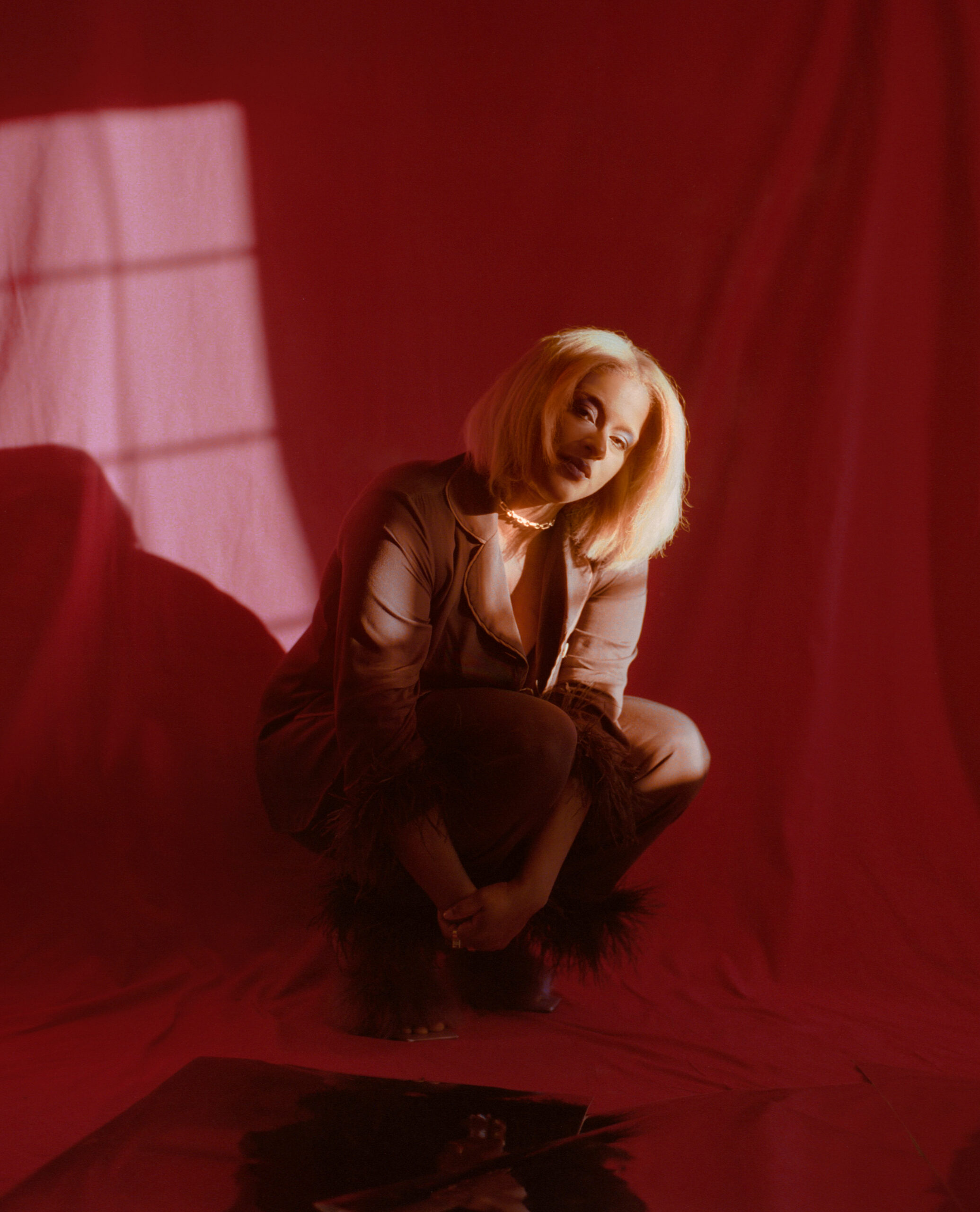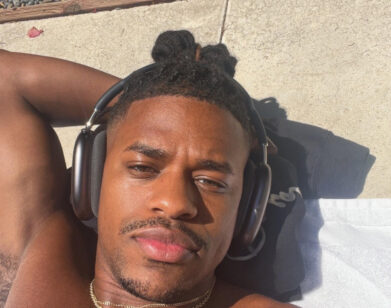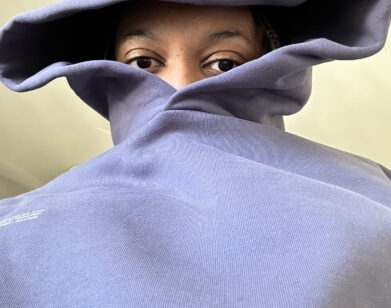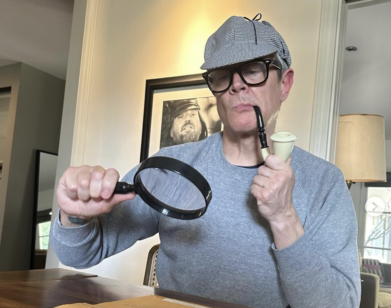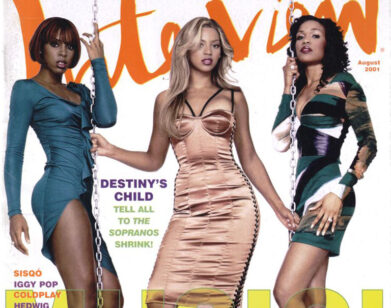PERSONA
“I Like the Idea of a Basic Bitch Album”: L’Rain, in Conversation With Marlon James
“All right, so I’m slightly confused about I Killed Your Dog,” the author Marlon James told L’Rain when the pair got on a call last month. “Is this a basic bitch album or is this an anti-breakup album?” L’Rain, née Taja Cheek, says it’s both, but you could forgive James for asking, since I Killed Your Dog, the third studio album from the Brooklyn-based pop-experimentalist, is many things at once: impressionistic, jazzy, synth-infused, cheeky, self-admonishing, self-exonerating, and delightfully weird. “The whole premise is to laugh to keep from crying,” explains L’Rain, who followed up her critically acclaimed 2017 self-titled debut with Fatigue, in 2021, before dropping I Killed Your Dog in October. “I think I’m trying to get out of my own head.” James, who won the coveted Man Booker Prize for 2017’s A Brief History of Seven Killings, has been a fan of her’s since the very beginning, having first seen L’Rain play at National Sawdust in Williamsburg in 2018. Just before the holidays, he got a chance to ask her about playing a character, incorporating jazz into her audio tapestry, and being a card-carrying member of the Beyhive.
———
L’RAIN: Hi. I’m cutting a pepper and I washed my hands, but apparently I didn’t wash my hands well enough.
MARLON JAMES: Oh my god, that’s the worst. My apartment in Williamsburg just got flooded and all my records from N to S got destroyed. Think Radiohead, Rolling Stones, Stereolab.
L’RAIN: Oh no, not Stereolab!
JAMES: Yeah. I don’t know if you ever heard this band called Opal.
L’RAIN: I haven’t.
JAMES: It’s the band Mazzy Star came from. The lead singer, Kendra Smith, quit and found her own replacement, Hope Sandoval, and they changed the name to Mazzy Star. But their first album was called Happy Nightmare Baby, and I found it on vinyl in a cutout bin in Berkeley. Yep, flooded out.
L’RAIN: Oh my god. Do you have a record of all of the albums that you had?
JAMES: I have a photo of all of them. Some of them I’m probably not going to buy back. I don’t think anybody needs a Rolling Stones album after 1980.
L’RAIN: It’s nature’s way of editing.
JAMES: All right, so I’m slightly confused about I Killed Your Dog. Is this a basic bitch album or is this an anti-breakup album?
L’RAIN: I like to think of it as both, but I really just like the idea of a basic bitch album.
JAMES: The breakup album is such a thing in rock. When men do it, it’s always so morose, like Beck’s Sea Change.
L’RAIN: Yes.
JAMES: I really like that record, but it’s like, “Dude, just drop one beat.” Whereas this album might be the most expansive-sounding one you’ve done.
L’RAIN: That’s very kind. The whole premise is to laugh to keep from crying. I think I’m trying to get out of my own head. I’m an only child. I spent a lot of time by myself and I’m kind of sick of it.
JAMES: I’m a middle child, which is kind of the same thing.
L’RAIN: In a way. It’s hard to write sometimes because the only way the work happens for me is to spend a lot of time alone thinking. When I was writing, I was thinking about my relationships with other people rather than spiraling in my own head.
JAMES: Me and my therapist have a term for where I go when I’m on my own too much. We call it the “void,” where I’m not thinking or creating. I’m not writing. I’m doom-scrolling or I’m just sitting down doing nothing. It got to the point where I started to think nothingness was normal. We talk about how I have a barometer for pain and a barometer for nothing, and he says, “You know, the opposite of pain is not nothing. The opposite of pain is pleasure.” And I’m like, “What is that?” Pleasure, what a concept! It’s a thing for people who are always on their own. It’s a blessing and a curse that we have to be alone to create.
L’RAIN: Yes.
JAMES: But when you bring in your collaborators, Andrew [Lappin] and Ben [Chapoteau-Katz], the creative process doesn’t stop.
L’RAIN: No. Sometimes it’s hard for me to be disciplined and to understand when the work begins and ends.
JAMES: For me, because all but one of my novels are in first-person, when I write, I feel like I’m living another person’s life. The book I’m writing now, I finally said, “I’ve waited five books, it’s time to write the gay novel.” I found myself taking stuff that happened to me, but giving it to somebody who’s not like me to see how they respond to it. How do you deal with racial consciousness? Throw it to a white Jamaican and see how they deal with it because I already spent my whole life in my bedroom moping over my problems. I don’t want to write about how I solved it. The answer is I didn’t.
L’RAIN: Exactly.
JAMES: Those things come to a listener out of nowhere on the album, like the imagery of the dead woman you use at the end of “Pet Rock.” I’m like “damn, girl.” I didn’t know we’re going there. Does your process of creating lead you to these things or do they kind of intrude?
L’RAIN: It’s very intrusive. My process is very organic and I end up in places I didn’t expect. I was thinking about creating characters and from what I’ve heard, characters kind of tell you where to go in your writing. That’s how I feel about my process. But yeah, that part was funny. It was a joke I misremembered. I remembered it as a joke and then as I was recording it, I realized it wasn’t a joke.
JAMES: It was not funny.
L’RAIN: That made it more funny to me, actually.
JAMES: Yeah, you’ve got to let characters be characters. I realized that the characters are just becoming people.
L’RAIN: I mean, that’s what makes your characters feel real even when it’s fantasy. I feel the same way about songs.
JAMES: Yeah. I consider myself a failed poet, but I still like rhythm and how words sound and I still write to be read aloud, so I’m the biggest fan of audiobooks. This guy in London from the Royal Society for the Blind visited me and said, “People forget that blind people read.” He was saying, “One of the things we appreciate about your books is that you don’t depend on sight to make something.” A book should smell and a book should have volume. It should scream and whisper and laugh. When you put together those sensory details, when do you know that you have a song?
L’RAIN: I’m never totally sure, but I’ll have a hunch that these fragments want to live together. It’s a feeling.
JAMES: Part of being an artist is that you see things working together long before everybody else does. My motto was “I’ll leave it in until my editor tells me to take it out.”
L’RAIN: I feel like the hardest part is the balance between trusting myself and trusting other people. There’s something about writing that makes the editing process way clearer than in music or film.
JAMES: The first time I was listening to Fatigue, I remember thinking, “There’s so many fragments here, but every fragment is a hook.”
L’RAIN: I appreciate that.
JAMES: It was actually my boyfriend Nick who put me on. He’s always on Spotify, but he’s actually genuinely searching out new people. It’s funny because almost all of my friends ended up in music but me.
L’RAIN: But you spent a lot of time in music.
JAMES: I had a lot of time around musicians ’cause I used to design their album covers. Sean Paul and I went to the same high school, which means I got drafted into helping to make Sean Paul a star. But I used to write music reviews, which I hope have disappeared, ’cause I don’t want to see any of them. The ’90s was a time.
L’RAIN: I would love to read those.
JAMES: No, I think I trashed people who I love now. In 1992, I was an alternative white woman. I knew the entire lyrics to Liz Phair’s Exile in Guyville. That album doesn’t have a lyric sheet, but I know them. The Breeders, Hole.
L’RAIN: I love PJ Harvey.
JAMES: PJ Harvey lyrics appear in my books all the time. I was writing Black Leopard, Red Wolf and I said, “It’s hard walking in a dress. It’s not easy.” I’m like, “Oh my god, she’s going to sue me.” I have a nonfiction class where I teach Is This Desire? And I used to put it against Weezer’s Pinkerton. These are two breakup records that couldn’t be any more different. PJ is dealing with such extreme shit that she has to create these women to handle them. She talks about “Angelene,” the biggest mess you’ve ever seen, and she talks about “My Beautiful Leah” and “Perfect Day Elise.” Going back to anti-breakup, did you find that you had to throw things into different personas?
L’RAIN: I feel like L’Rain is one big persona. It can sometimes be me and it can sometimes be someone else or somewhere in between. I throw things, maybe not to different people, but different versions of myself. I used to shift perspectives in my lyrics a lot where I would say “you” but I really meant “I.”
JAMES: I almost wrote a full novel in second-person once but it looked like a gimmick, although some novelists have done it. Did you ever have a situation where an experiment didn’t work?
L’RAIN: Yeah. I have a graveyard of things, but I try to believe that there aren’t any bad ideas, just bad applications. If you’re writing something that you end up not finishing, how do you revive it?
JAMES: It goes back to what we’re talking about where characters decide. Very few of my books begin with the beginning. I think the first page I wrote for A Brief History of Seven Killings is now on page 450. Just because you started somewhere doesn’t mean that’s the beginning or the ending.
L’RAIN: It’s not always the best way to tell a story. The beginning is just, you know… What is the beginning?
JAMES: How do you know when a song is done?
L’RAIN: It used to be when people told me it has to be done. Now I feel like I have a better internal compass. I make shifts because the song needs it, and at a certain point the song doesn’t need it, I need it. I make changes that I know I need, and when I’m done with that, it’s the end. If I let enough time pass, I won’t remember that there was anything else that needed to happen, but I have to let a long time pass. I can’t listen to this record for another year or two.
JAMES: That reminds me of the executive producer on A Tribe Called Quest’s Low End Theory talking about literally grabbing the record away from Q-Tip because he refused to think it was done. I don’t know either.
L’RAIN: Yeah. People don’t really think of producers as editors, but they definitely are.
JAMES: I’ve seen you live twice now. One was a solo show two doors down from where I used to live in Williamsburg. It was just you on guitar and effects on a Sunday night, and that was when we finally met. What was the name of that space again?
L’RAIN: Oh my god, Sawdust. That is where we met.
JAMES: Was that your first time solo?
L’RAIN: That was the first time in a very long time. It’s freeing because you can just do what you need to do. If you play a section over, you just roll with it. It takes more communication to be able to do that with a band. But I don’t really perform solo because I don’t like being by myself and I’ve learned to trust my bandmates. They’re like my brothers at this point. I really rely on them, and when someone else makes a different choice, that makes me make a different choice and there’s that back and forth.
JAMES: Do you enjoy that?
L’RAIN: Yeah, it took me a while to really embrace it. I have a tortured relationship to improvisation, but I play with jazz musicians for whom that is a big foundation of their musical practice. There’s so much that you can learn in the moment, and forced improvisation is where I learn the most about myself and my songs.
JAMES: Do you see yourself playing more jazz?
L’RAIN: I just play with jazz musicians. I don’t know how that happens. I don’t know anything about jazz, really.
JAMES: But I think because your music is so expansive, it also allows entry for a lot of different musicians and listeners. My best friend Ingrid and I have accepted that we do not listen to each other’s music. She loves Trinidadian Soca and I’m like, “Where can I blast some death metal to get this out of my head?” But we both fell for your music. That’s why I say each fragment is a hook.
L’RAIN: I always worry when I’m about to release a record that either there’s so much stuff in it that anybody can relate to it or there’s so much stuff that no one relates to it.
JAMES: But I think it doesn’t sound overly fussy.
L’RAIN: That’s all I aim for.
JAMES: I can think of albums that do. I don’t want to name anybody. Some later Basement Jaxx albums are like, “Dude, there are 200 ideas here. Pick three.” I was reading another interview where you’re saying all musicians are curators. How important do you think taste is?
L’RAIN: I think taste is everything. Probably more important than technique, which feels like a cop-out.
JAMES: No, no.
L’RAIN: There are a lot of people that have chops, but having chops doesn’t mean that you’re making good music. It just means you’re technically proficient. And a sense of purpose is important too, and having an artistic point of view. I don’t know if all musicians have that.
JAMES: One of the things that always impresses me about Beyoncé is actually her taste, which is not to take anything away from talent or song, but when I listen to Renaissance, I think she’s an excellent curator. I am definitely a member of the Beyhive.
L’RAIN: And timeliness, too.
JAMES: Talk more about that.
L’RAIN: Renaissance, if it were released years before, wouldn’t have hit the same and had the same urgency, but it was released at this moment, and that’s why it was able to be received in the way that it was. I feel that way about a lot of music that I love. At that moment it mattered, and it continues to matter.
JAMES: I think there’s something similar in books. I have read books that I think came out too late, or the author seems tone-deaf about the world.
L’RAIN: Yes.
JAMES: At the same time, I think different writers allow you to see the world in different ways, like what Toni Morrison did for me. I certainly didn’t write women characters the way I did until I read her. You can tell when an author thinks he’s smarter than his audience, and sometimes when a musician is talking down or pandering. For lack of a better word, is one of the characters you confront in your songs your younger self?
L’RAIN: Definitely. I’m always trying to figure her out. There’s a spark I had then that I feel like I’m kind of chasing to get back to. Maybe a blissful ignorance. I didn’t know the rules, so I didn’t know I was breaking any.
JAMES: Yeah.
L’RAIN: Oh my god, one second. Someone’s at my door and she always calls me queen every time she comes.
JAMES: Sure.
L’RAIN: Okay. I love this benevolent Hotep mail person that always comes to my door.
JAMES: I was in a car with a Hotep once, and I was like, “Do I tell him now or later that I’m queer?”
L’RAIN: Oh god.
JAMES: Then he started to quote the King James Bible. I’m like, “Dude, you’re quoting the whitest of all the Bibles. Who do you think King James is?” He thought King James was some Arab king. I’m like, “King James was a steward.” He couldn’t even process it. If you’re going to be a major Hotep, almost to the point of being a Black racist, you might as well get your Bible straight.
L’RAIN: Exactly.
JAMES: People choose their own narratives.
L’RAIN: I don’t know why, but I’ve been so curious about the difference between writing a book and writing for the screen.
JAMES: There are a lot of things I get from film and from TV. You have to get a lot done in an hour and you can’t oversell it. One thing I learned from it is economy, and you have to get to the bare bones. When I go back to writing a book, I realize I don’t need half of this stuff.
L’RAIN: That’s interesting. You seem like such a fluid dialogue writer.
JAMES: I love dialogue, but dialogue means you have to be curious about people. I remember telling my students, “When there’s an argument, you have to walk towards it.” I remember once my neighbor and their partner got into a fight and I’m like, “I’m going to get some dialogue tonight.” I’m pressing the glass against the wall and my ear against the glass, and the guy says, “You know what I’m going to do? I’m going to take a trip to planet me.” I literally groaned and he heard me. He’s like, “I think somebody’s listening.”
L’RAIN: A trip to planet me?
JAMES: I don’t expect crappy dialogue from real people. But dialogue sometimes is the way people use subtext instead of text. My mom is never going to say, “I miss you. Why don’t you call?” She’s going to call and go, “Did you eat?” And if you know your mom, you know that there are 15 sentences in that three word sentence. People don’t say things.
L’RAIN: I wanted to talk to you about failure too. I always wonder what the relationship is between success and freedom. I keep thinking about you sending your book around.
JAMES: When I was writing my second novel, which is written in enslaved Patois, I was asked to rewrite the whole thing. I think it was person number 79 who said, “yeah, I’m going to publish it,” which means 78 people said no. It’s hard sticking by what you think hoping that somebody will see what you’re trying to do, because my experience for the most part is that a lot of people in the industry don’t.
L’RAIN: But sometimes that can be an indication that what you’re doing is important. And you have to do it anyway.
JAMES: Yeah. Maybe it’s hubris, but a few dozen people can all be wrong.
L’RAIN: Definitely. We see that with government all the time. Thousands of people can be wrong.
JAMES: All the wrong people are just on the same side.
L’RAIN: Exactly.
JAMES: Are you going back on the road?
L’RAIN: Yes, in a couple weeks. I have to fix all my equipment and then figure out if I want to completely redo my whole setup.
JAMES: Your music setup?
L’RAIN: Yeah, we use a lot of equipment.
JAMES: I’ve seen you on stage. There’s a lot. My boyfriend keeps texting me saying, “Remember, I saw her first.”
L’RAIN: I love it. Thank you so much. So great to talk to you, Marlon.
JAMES: We should talk again soon.
L’RAIN: I hope so.

